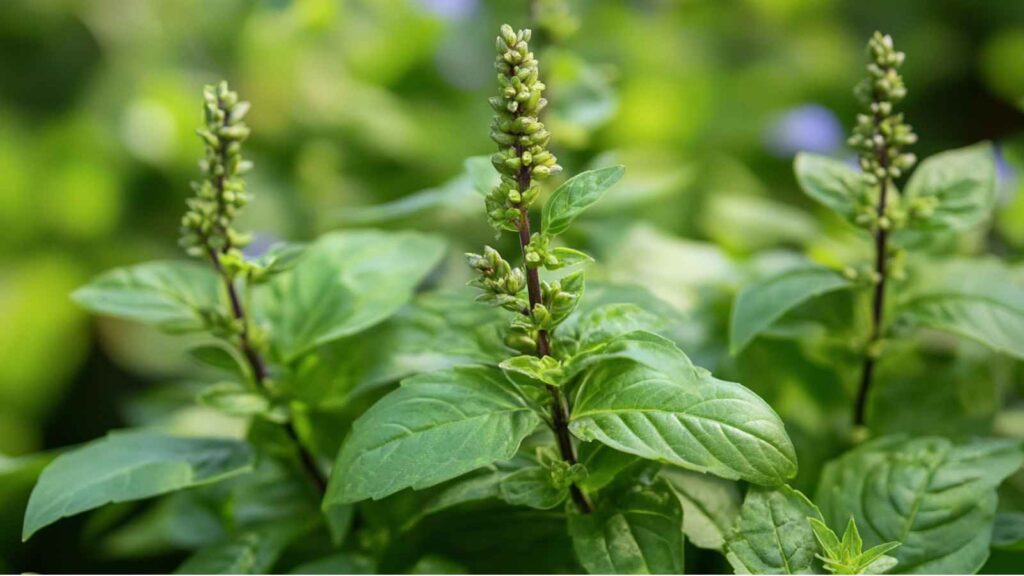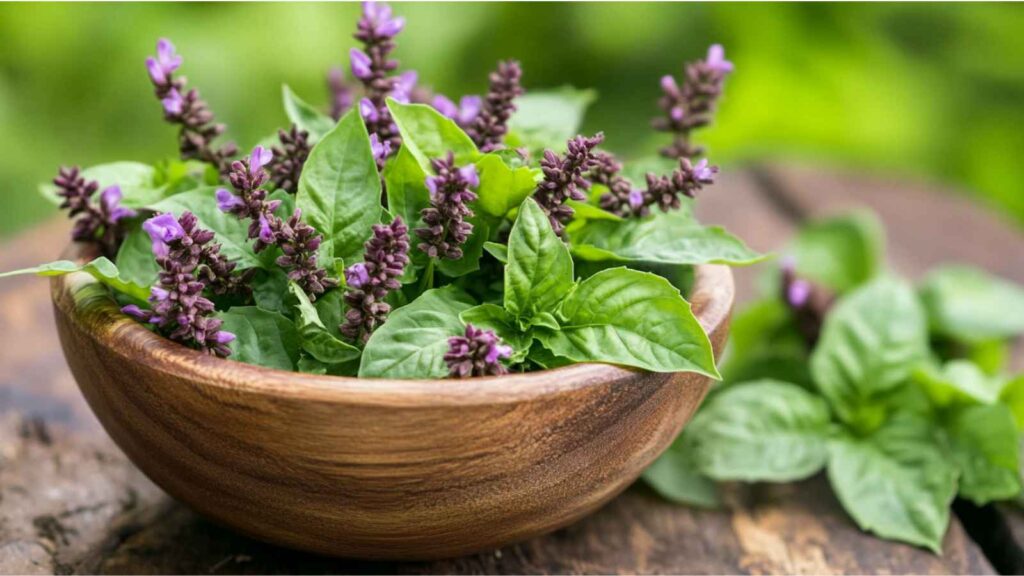Hinduism is renowned for its intricate symbolism and the profound spiritual connection between nature and the divine. Among the many sacred elements in this ancient faith, Tulsi (holy basil) stands out as one of the most venerated and revered. Known for its medicinal properties, purifying aura, and deep spiritual symbolism, Tulsi is far more than just a plant—it is considered a divine manifestation, a protector of the household, and an emblem of purity and devotion.
Read More About Hindu Temples
Across countless scriptures—from the Vedas and Upanishads to the revered Tulsi Purana—Tulsi is celebrated for its life-sustaining qualities and its role in rituals and daily worship. It is a constant presence in households, temples, and sacred groves, serving as a living link between the earthly and the divine.
In this article, we delve into the timeless allure of Tulsi. We explore its spiritual significance, the philosophical guidance embedded in ancient texts, and its central role in rituals and daily life. We also profile a temple dedicated to Tulsi—the Tulsi Mandir in Vrindavan, Uttar Pradesh—detailing its history, architectural marvels, and the immersive visitor experience it offers. Additionally, learn how modern digital art can be used to reimagine Tulsi’s sacred beauty through AI-generated imagery.
Whether you are a devout practitioner, a cultural enthusiast, or a seeker of ancient wisdom, this comprehensive exploration of Tulsi offers actionable insights and inspiration for your spiritual journey.
Tulsi (Holy Basil): A Sacred Symbol in Hinduism

Spiritual and Philosophical Significance
Tulsi, often referred to as “The Queen of Herbs,” is widely regarded as a symbol of purity, devotion, and eternal life. In Hindu tradition, it is believed that the Tulsi plant is a physical embodiment of the goddess Tulsi or Vrinda, whose presence brings blessings, spiritual energy, and protection. Devotees maintain that the plant purifies the atmosphere, dispels negativity, and provides healing—both physically and spiritually.
Key spiritual attributes of Tulsi include:
- Purity and Sanctity:
The plant’s fresh, aromatic leaves are used in daily worship and rituals to cleanse spaces and purify the mind and body. - Devotion and Love:
Tulsi is synonymous with love and devotion, often linked with Lord Vishnu and his avatars. Devotees believe that regular worship of Tulsi fosters a deeper spiritual connection with the divine. - Healing and Vitality:
With its well-known medicinal properties, Tulsi is celebrated for promoting health and longevity. This healing aspect is intertwined with its spiritual symbolism of life and vitality.
Foundational Scriptures and Ritual Guidance
The revered scriptures of Hinduism offer profound insights into the significance of Tulsi. The Tulsi Purana, an important text in the Puranic genre, details the mythology, rituals, and ethical guidance associated with Tulsi. Other foundational texts, including the Vedas and various Upanishads, also reference the sacred qualities of this holy herb.
Key Scriptural References
- Tulsi Purana:
This scripture narrates the divine origins of the Tulsi plant, its association with the goddess Tulsi, and its role in devotional practices. It provides detailed guidelines on how to honor the plant through ritualistic offerings and daily worship. - Vedic and Upanishadic References:
The Vedas, though primarily focused on hymns and rituals, underscore the importance of purity and natural elements, with Tulsi frequently cited as a symbol of life and spiritual clarity. - Ritual Practices:
Devotees often perform daily pujas that include the offering of water, milk, and flowers to the Tulsi plant, reciting sacred hymns and mantras to invoke divine blessings. This ritual not only connects practitioners to the divine but also reinforces ethical living and mindfulness.
“Tulsi, the sacred herb, embodies the essence of purity and devotion, reminding us that every leaf is a testament to nature’s divine artistry.”
(This quote reflects traditional wisdom echoed in commentaries on the Tulsi Purana and Vedic hymns.)
The Cultural and Ritual Importance of Tulsi

Daily Worship and Home Altars
In Hindu households, Tulsi is more than just a medicinal plant—it is a cornerstone of spiritual practice. Most homes maintain a Tulsi plant in a dedicated corner or altar. Daily worship of Tulsi includes:
- Morning and Evening Puja:
Devotees offer water, incense, and prayers to Tulsi at sunrise and sunset, believing that these rituals invite positivity and ward off negativity. - Medicinal Use:
Beyond its spiritual applications, Tulsi is a natural remedy for various ailments, symbolizing the interconnectedness of physical health and spiritual well-being. - Festivals and Celebrations:
During festivals such as Tulsi Vivah (the ceremonial marriage of Tulsi to Lord Vishnu), elaborate rituals and community celebrations highlight the plant’s sacred role in Hindu culture.
Tulsi in Sacred Narratives and Mythology
Legend holds that the goddess Tulsi was a devout follower of Lord Vishnu who was transformed into a holy plant as a mark of divine blessing. This myth not only explains the plant’s sacred status but also reinforces the virtues of devotion, sacrifice, and humility. Tulsi’s story is retold in numerous local legends, devotional songs, and literary works, further cementing its role as a symbol of unwavering faith and divine grace.
Temple Profile: Tulsi Mandir, Vrindavan, Uttar Pradesh
One of the most revered temples dedicated to Tulsi is the Tulsi Mandir in Vrindavan, Uttar Pradesh. Vrindavan, the land of Lord Krishna, is synonymous with divine love and devotion, and Tulsi plays an integral role in its spiritual heritage.
Name and Exact Location
- Temple Name: Tulsi Mandir
- Location: Vrindavan, Uttar Pradesh, India
Historical Background
Tulsi Mandir in Vrindavan has a storied past that intertwines local folklore with deep-seated devotional traditions. Believed to have been established centuries ago, the temple has long served as a sacred center for worshipping the holy Tulsi plant. Historical records suggest that the temple was founded during a period when devotion to Lord Krishna was flourishing, and Tulsi was revered as a symbol of his eternal consort, embodying purity and spiritual love.
Over time, the temple has witnessed numerous restorations and enhancements, reflecting the evolving architectural styles while preserving the sanctity of its original design. Royal patronage and community support have further enriched its legacy, making Tulsi Mandir a cherished spiritual landmark in Vrindavan.
Architectural Highlights
Tulsi Mandir is a fine example of traditional North Indian temple architecture, infused with the vibrant cultural aesthetics of Vrindavan. Its design not only honors the sacredness of Tulsi but also creates an atmosphere conducive to meditation and devotion.
- Intricate Carvings and Murals:
The temple’s walls are adorned with detailed carvings and murals that depict the mythological narrative of Tulsi and her divine association with Lord Vishnu. These artistic expressions serve as visual sermons that celebrate the virtues of purity, devotion, and sacrifice. - Sacred Altar for Tulsi:
A dedicated space within the temple serves as the altar for the Tulsi plant. Here, the plant is meticulously cared for and worshipped daily, symbolizing its living status as a divine embodiment. - Blend of Traditional and Contemporary Elements:
While the temple retains its ancient architectural charm, modern elements have been thoughtfully integrated to enhance the comfort and experience of devotees. This harmonious blend makes the temple accessible to both traditional pilgrims and modern visitors. - Natural Aesthetics:
The temple complex is surrounded by lush gardens and water bodies, echoing the natural purity of Tulsi. The serene environment not only enhances the spiritual experience but also provides a retreat from the bustling city life.
Visitor Experience
Visitors to Tulsi Mandir in Vrindavan can expect a deeply immersive and transformative experience:
- Spiritual Ambiance:
The temple exudes a calm and meditative energy, accentuated by the gentle rustling of Tulsi leaves and the fragrance of incense. The sounds of devotional chants and traditional hymns create an atmosphere of divine serenity. - Interactive Rituals:
Devotees are invited to participate in daily rituals, including the sacred offering of water and flowers to the Tulsi plant. These hands-on experiences foster a personal connection with the divine and offer insights into the deep-rooted traditions of Hindu worship. - Guided Tours and Cultural Narratives:
Knowledgeable guides provide historical and cultural context, sharing fascinating stories and legends about Tulsi’s role in Hindu mythology. These tours enrich the visitor experience, making each visit both educational and spiritually uplifting. - Festivals and Special Events:
During key festivals like Tulsi Vivah, the temple hosts vibrant celebrations with music, dance, and theatrical reenactments of ancient myths. Such events draw large crowds and offer a glimpse into the communal spirit and festive traditions of Vrindavan.
The Broader Cultural Impact of Tulsi
Tulsi in Daily Life and Community
Beyond temple walls, Tulsi occupies a central place in the daily lives of millions of Hindus. It is a common sight in home courtyards, where the plant is nurtured as a living symbol of divine protection and maternal care. Families believe that maintaining a Tulsi plant in their home attracts positive energy, good fortune, and spiritual well-being.
- Household Worship:
Every morning and evening, many households perform a simple puja dedicated to Tulsi. This ritual serves as a reminder of the interconnection between nature, health, and spirituality. - Medicinal and Nutritional Benefits:
Tulsi is widely used in traditional Ayurvedic medicine for its healing properties. Its leaves, tea, and extracts are believed to boost immunity, reduce stress, and promote overall well-being—qualities that complement its revered spiritual status. - Community Celebrations:
Festivals and local fairs often feature Tulsi-centric events, where artisans, musicians, and storytellers come together to celebrate its legacy. These gatherings not only honor the plant but also reinforce the communal bonds and shared cultural heritage.
Tulsi’s Role in Rituals and Festivals
Tulsi is at the heart of many Hindu rituals, from daily worship to grand community festivals. Its presence is believed to:
- Purify and Sanctify:
Tulsi’s sacred leaves are used to purify water, create sacred garlands, and even prepare holy ash (vibhuti). Such practices underline its role as a natural purifier and spiritual cleanser. - Enhance Devotional Practices:
Chanting mantras and reciting prayers in the presence of the Tulsi plant is thought to enhance spiritual focus and devotion. The harmonious blend of nature and divinity encourages mindfulness and inner peace. - Symbolize Eternal Life:
As a perennial plant that flourishes year-round, Tulsi represents the cycle of life, renewal, and eternal energy—a core theme in Hindu philosophy.


